The Daily Bulletin is published by Internal and Leadership Communications, part of University Communications
Contact us at bulletin@uwaterloo.ca
Submission guidelines
Editor:
Brandon Sweet
University Communications
bulletin@uwaterloo.ca
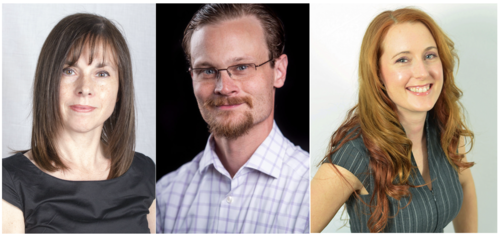
Pia Zeni, Daniel Opperwall, and Kristin Wilson, Centre for Extended Learning.
By Dana Francoeur, Centre for Extended Learning. This article is one of a series celebrating open scholarship during Open Access Week. It is brought to you by the Open Scholarship Committee.
“It’s like bungee jumping without a cord.”
This is what Pia Zeni remembers an instructor saying about creating impactful online courses on their own.
For many years, instructors of online courses often lacked the support and tools to create successful online courses. Many instructors still feel they lack resources. Meeting this need are two new Open Educational Resources (OERs): High Quality Online Courses and Humanizing Virtual Learning.
High Quality Online Courses (HQOC) is a course on how to improve course design and delivery for post-secondary learners. Humanizing Virtual Learning (HVL) is a guide to help post-secondary educators foster engagement, connection, and inclusivity in an online learning environment.
Housed on eCampusOntario’s Open Library Publishing Platform, both courses are licensed under the Ontario Commons License as well as a Creative Commons Attribution-NonCommercial-ShareAlike 4.0 International License. These licenses permit copying, reuse, and modification. However, the Ontario Commons license limits use to educators at Ontario colleges and universities, while the additional CC license allows for use by anyone, anywhere in the world.
Providing support to all online instructors was one of the course authors’ objectives. While conceptualizing these courses, authors Daniel Opperwall, Kristin Wilson, and Pia Zeni recognized that most institutions were not as well-resourced as Waterloo when it came to instructional designers and multimedia developers.
Instructors of online courses wanted pragmatic instruction with workable examples. They were asking “what does it look like?” and wanting to “see it.” HQOC and HVL were designed to provide that visual, said Zeni.
HQOC does this particularly well, as Zeni pointed out, ending each module with activities that allow educators to effectively build and plan actual parts of an online course.
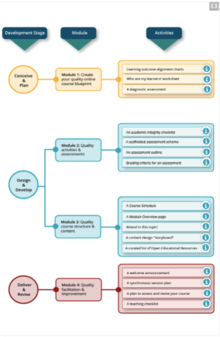
© University of Waterloo. Made available under CC BY-NC-SA 4.0
Because HQOC and HVL are open educational resources (OERs), instructors are able to customize them to suit their individual needs. “That’s the beauty of it,” said Opperwall. He pointed out that while a book can’t be reworked into something new to fit a different or more specific scenario, OERs are endlessly customizable. “You can mix and match, tweak it, change it, grab pieces of it…the possibilities are endless and more economical, and knowledge is being shared and built on,” Opperwall said.
Not only can end users easily adapt the courses for their own uses, the authors can also update them. HQOC has not even been live a full year yet and Zeni has already been proactively adding to the “Resources for Further Study” sections when she finds something that would have been great to include. “I’ve already done that once or twice…and that’s one of the nice things about OERs. They are very easy to edit,” she said.
OERs will be increasingly important in academia, predict Opperwall and Zeni. Opperwall is currently involved in designing two more OERs, sponsored by the University of Waterloo Library through the OER Fellows Program. When asked what he would tell someone interested in creating or adapting an OER, he said, “I think what I’d say is why not? …This is going to be so much fun [and] it’s going to be so rewarding.”
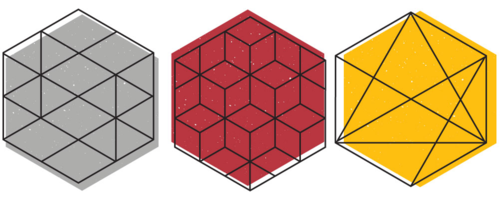
A message from Graduate Studies and Postdoctoral Affairs.
Support Waterloo’s strategic plan to strengthen sustainable and diverse communities by encouraging recent PhD graduates in any field of study to apply for the Provost’s Program for Black and Indigenous Postdoctoral Scholars.
The Program advances institutional initiatives to create a culture of equity, diversity, and inclusivity for all, improving the representation, participation, and engagement of equity-deserving groups within our community. We invite applications for the inaugural award, which provides successful candidates with annual support that includes a salary of $60,000 plus a benefits package. The scholars will also receive a one-time research fund of $5,000 at the time of their appointment. The value of the support demonstrates the importance of and commitment to interdisciplinary research at Waterloo. The maximum term of the appointment is 2 years and up to four positions will be granted in 2023.
Specific funding is also available within the AMTD Waterloo Global Talent Postdoctoral Fellowship Program for Black and Indigenous scholars.
Applicants must have support / endorsement from a University of Waterloo researcher prior to applying; the application deadline is December 1, 2022. For more details, including eligibility criteria, the endorsement process, please visit the Provost’s Program for Black and Indigenous Postdoctoral Scholars web page.
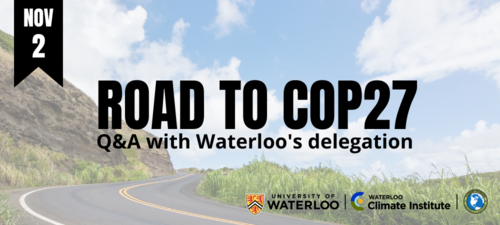
A message from the Waterloo Climate Institute.
We are at a pivotal moment in our collective goal to limit global warming to 1.5 degrees. For this reason, the meeting of the world’s leaders in Egypt from November 6 to 18 for the climate change negotiations at the United Nations Framework Convention on Climate Change (UNFCCC) annual Conference of the Parties (COP) is more critical than ever.
The University of Waterloo, through the Waterloo Climate Institute, has been an official observer of the conferences for many years. For COP27, the institute will send an in-person delegation of top student leaders and faculty researchers to represent the University, bear witness to the negotiations, and foster an informed conversation about the climate crisis at Waterloo.
On Wednesday, November 2 at 2:45 p.m., join the delegation on campus for the Road to COP27 event – a discussion of the crucial issues that need to be tackled. This will be a chance learn about COP and the expertise that each of the delegates brings to the table, spanning topics of health, governance, energy, and communications.
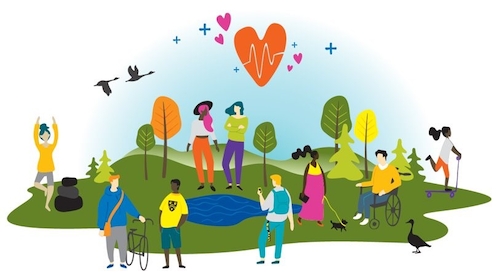
A message from the Universal Design for Learning and Wellbeing Community of Practice.
The Wellness Collaborative, Centre for Teaching Excellence, Centre for Extended Learning, Student Success Office, AccessAbility Services, and fellow instructors have partnered up to critically look at how UDL can (and cannot) support holistic wellbeing in the learning environment. We invite you, instructors and others who support the learning environment, to join us in a Community of Practice (CoP).
We are excited to announce that our next Community of Practice meeting, Harnessing UDL for wellbeing in learning environments, takes place this week on Thursday October 27 at 1:00 p.m.
We will engage in critical refelction of the impacts of UDL on instructor workload and the importance of the ‘start small and build from there’ approach. There will be opportunities to discuss with presenters and other group members regarding ‘places to start’ in your own practice.
For more details about each session, see our website.
The CoP will be hosted virtually through Microsoft Teams and members can access resources and support asynchronously.
To get involved in the CoP, please complete this brief Qualtrics survey.
Please note that you do not need to attend all three sessions to join the CoP, as our aim is to make this CoP accessible for all who are interested. We look forward to connecting with you.
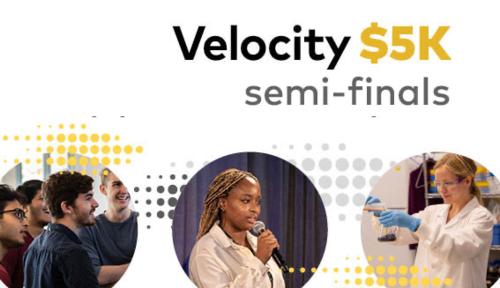
A message from Velocity.
Twenty-three student teams contend for four $5,000 prizes — but first they must present the perfect pitch.
The time is here for University of Waterloo’s ambitious student startups to compete at the Velocity $5K pitch competition. The competition will see early-stage student ventures battle it out onstage for a chance at one of four $5,000 awards. The first round of competition kicks off on November 9 and 10 and features 23 aspiring teams. These 23 semi-finalist teams were selected by an experienced panel of entrepreneurs, following a difficult adjudication process that saw 72 applications from 160 students.
Each semi-finalist will have just three minutes to present their idea and convince a new panel of judges that it has potential and viability to succeed. Only then will they move on to the final round.
The top eight teams from the two rounds will return to the stage for the finals on November 23. After the pitching magic happens, four teams and their innovative business ideas will take home $5,000 in grant funding to help grow their ambitions.
Join us on November 9 and 10 at South Campus Hall to see who will win the judges over and cheer on your UWaterloo peers.
See the pitches live and meet the teams
Witness 13 early-stage startups featuring 21 UWaterloo students from within the faculties of Engineering, Mathematics, Environment and Arts pitch to win in night one of the Velocity $5K semi-finals:
AFAIK; Coastal; Electric Boats & Regenerative Fertilizers; Hexa; LandscapeDirect; Liquitronix; PedalRoutes; Penspyre; RelayMD; Serv2U; Totazi; TrainPro; and Werkspat.
Night two of the Velocity $5K semi-finals showcases 10 teams with 15 UWaterloo students from the faculties of Engineering, Mathematics, Arts and Health:
Chariot Mobility; Goose; HydroMag; IDEAL; MedInclude; Outseek; Pegasus; Quickcast; ShootFree; and Skipwash.
Learn more and register to attend
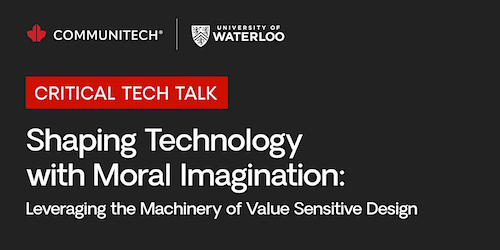
A message from the Critical Media Lab.
Please join us for the 4th event in the Critical Tech Talk series of honest talks about innovation. For this hybrid event, we are thrilled to be hosting Professor Batya Friedman, a pioneer of Value Sensitive Design for a talk entitled Shaping Technology with Moral Imagination: Leveraging the Machinery of Value Sensitive Design.
Tools and technologies do no less than create and structure the conditions in which we live, express ourselves, enact society, and experience what it means to be human. They are also the result of our moral and technical imaginations, which are subjective and often constrained by systems of privilege and power. Value Sensitive Design (VSD) was developed as an approach to address this challenge from within technical design processes. Drawing on over three decades of work, in this interactive talk will provide an introduction to value sensitive design, foregrounding human values in the technical design process.
The event takes place Friday, October 28, from 4:00 p.m. to 5:30 p.m. followed by a reception. Attend online or in person at the Centre for International Governance Innovation (CIGI). Register here.
Batya Friedman is a Professor in the Information School and holds adjunct appointments in the Paul G. Allen School of Computer Science & Engineering, the School of Law, and the Department of Human Centered Design and Engineering at the University of Washington where she co-founded the Value Sensitive Design Lab and the UW Tech Policy Lab. Value sensitive design, pioneered by Dr. Friedman, has been adopted internationally, and it has been applied in architecture, biomedical health informatics, civil engineering, computer security, energy, global health, human-computer interaction, human-robotic interaction, information management, legal theory, moral philosophy, tech policy, transportation, and urban planning, among other areas.
Carl Tutton is undertaking a PhD in Sustainability Management. His background in end-of-life electronic waste policy and management systems, material flow analysis, and long-time interests and hobbies in consumer electronics led to his interest in the beginning of the lifecycle of products, the design phase. His work seeks to analyze successful implementations of, and barriers to, sustainable design changes and more efficient product lifecycles.
Sid Heeg is a PhD student in Sustainability Management. Their research focuses on mis/disinformation surrounding farming and farm practices and how to bridge the knowledge gap between urban and rural populations. They are interested in learning how social media algorithms play a role in the continued spread of mis/disinformation and how it impacts sustainable farming practices.
Marcel O’Gorman is a Professor of English, University Research Chair, and Director of the Critical Media Lab. He co-wrote the Tech for Good Declaration and leads several funded research projects on the topic of Responsible Innovation. His publications, cross-sector workshops, and critical design projects reflect on the entanglement of technology, humanity, and the more-than-human.
Questions about the event? Contact Marcel O’Gorman: marcel@uwaterloo.ca
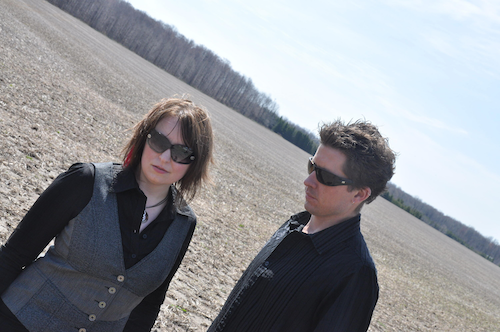
The latest Noon Hour Concert at Conrad Grebel University College takes place today at 12:30 p.m. and is called "A Moment in Time." Stealth, featuring bass clarinetist Kathryn Ladano and percussionist Richard Burrows, will take you on a musical journey exploring sonic landscapes and rhythmic chaos. Having performed together for over a decade, Stealth takes a deep dive into the world of improvisation. Their music can be tranquil and contemplative or explosive and pulsating, striving to bring a unique experience to every audience. The free concert takes place in the Conrad Grebel chapel and is open to all.
Media Relations invites faculty members, postdocs and PhD students to hear from Scott White, editor-in-chief of the Conversation Canada, on ways academics and researchers can become authors for the publishing platform. Learn about strategies for pitching your idea, their editing process, and the analytics dashboard that is built into an author's profile. The session is limited to academics and researchers, including postdocs and PhD students. The event takes place on Friday, October 28 from 10:30 a.m. to 12 noon. To attend this webinar, you must register in advance by emailing Pamela Smyth.
 UW Fitness is looking forward to offering their next 6-week cycle of both in-person and remote fitness classes. Thanks to funding from the UW Staff Association’s Staff Excellence Fund, all UWaterloo staff will receive a 50 per cent discount on registrations for select fitness programs.
UW Fitness is looking forward to offering their next 6-week cycle of both in-person and remote fitness classes. Thanks to funding from the UW Staff Association’s Staff Excellence Fund, all UWaterloo staff will receive a 50 per cent discount on registrations for select fitness programs.
"Classes start the week of October 31st, and spaces are limited so sign-up ASAP," says a note from UW Fitness.
For more information, including a list of program offerings and how to register, visit the UW Fitness website.
For more specific inquires, feel free to contact us at fitness@uwaterloo.ca.
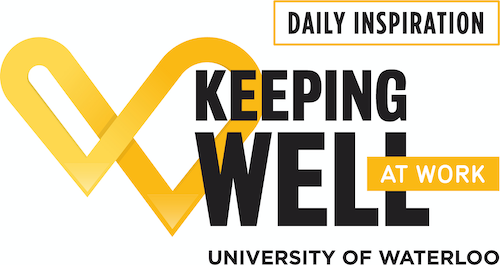
Here's today's Keeping Well at Work Daily Inspiration:
Try to get outside today and notice the world around you. Can’t get outside? View these virtual webcams to take a break.
Students can visit the Student Success Office online for supports including academic development, international student resources, immigration consulting, leadership development, exchange and study abroad, and opportunities to get involved.
Instructors looking for targeted support for developing online components for blended learning courses, transitioning remote to fully online courses, revising current online courses, and more please visit Agile Development | Centre for Extended Learning | University of Waterloo (uwaterloo.ca).
Instructors can access the EdTech Hub to find support on Waterloo’s centrally supported EdTech tools. The Hub is supported by members of IST’s Instructional Technologies and Media Services, Centre for Teaching Excellence, Centre for Extended Learning and subject matter experts from other campus areas.
Supports are available for employees returning to campus. Visit IST’s Hybrid Work and Technology guidelines and workplace protocols to assist with the transition.
Students with permanent, temporary and suspected disabilities and disabling conditions (medical conditions, injuries, or trauma from discrimination, violence, or oppression) can register with AccessAbility Services for academic accommodations (classroom accommodations, testing accommodations, milestone accommodations).
Instructors can visit AccessAbility Services' Faculty and Staff web page for information about the Instructor/Faculty role in the accommodation process. Instructors/Faculty members are legally required to accommodate students with disabilities. AccessAbility Services (AAS) is here to help you understand your obligations, and to offer services and resources to help you facilitate accommodations.
The Writing and Communication Centre has in-person and virtual services to support grad and undergrad students, postdocs and faculty with any writing or communication project. Services include one-to-one appointments, drop-ins at Dana Porter Library, online workshops, writing groups, English conversation practice, and custom in-class workshops.
Co-op students can get help finding a job and find supports to successfully work remotely, develop new skills, access wellness and career information, and contact a co-op or career advisor.
The Centre for Career Action (CCA) has services and programs to support undergrads, grad students, postdocs, alumni, and employees in figuring out what they value, what they’re good at, and how to access meaningful work, co-op, volunteer, or graduate/professional school opportunities. Questions about CCA's services? Live chat, call 519-888-4047, or stop by our front desk in the Tatham Centre 8:30 a.m. to 4:30 p.m., Monday to Friday.
Drop-in to in-person Warrior Study Halls on Thursdays from 5:00 p.m. to 6:30 p.m. in DC and DP. Join a Peer Success Coach to set goals and work independently or in groups each week.
Renison's English Language Institute continues to offer virtual events and workshops to help students practice their English language skills.
If you feel overwhelmed or anxious and need to talk to somebody, please contact the University’s Campus Wellness services, either Health Services or Counselling Services. You can also contact the University's Centre for Mental Health Research and Treatment. Good2Talk is a post-secondary student helpline available to all students.
The Library is here to help, both in person and online. Our spaces are open for access to book stacks, study space, computers and printers, and the IST Help Desk. For in-depth support, meet one-to-one with Librarians, Special Collections & Archives and Geospatial Centre staff. Access our resources online for anywhere, anytime learning and research. Full details on current services and hours are available on the Library’s COVID-19 Update webpage.
The Faculty Association of the University of Waterloo (FAUW) continues to advocate for its members. Check out the FAUW blog for more information.
The University of Waterloo Staff Association (UWSA) continues to advocate for its members. Check out the UWSA blog for more information.
The Sexual Violence Prevention and Response Office (SVPRO) supports all members of the University of Waterloo campus community who have experienced, or been impacted, by sexual violence. This includes all students, staff, faculty and visitors on the main campus, the satellite campuses, and at the affiliated and federated Waterloo Institutes and Colleges. For support, email: svpro@uwaterloo.ca or visit the SVPRO website.
The Office of Indigenous Relations is a central hub that provides guidance, support, and resources to all Indigenous and non-Indigenous campus community members and oversees the University's Indigenization strategy.
The Waterloo Indigenous Student Centre, based at United College, provides support and resources for Indigenous students, and educational outreach programs for the broader community, including lectures, and events.
WUSA supports for students:
Peer support - MATES, Glow Centre, RAISE, Women’s Centre - Click on one of the links to book an appointment either in person or online for the term.
Food Support Service food hampers are currently available from the Turnkey Desk 24/7 in the Student Life Centre. Drop-off locations are also open again in SLC, DC, DP, SCH, and all residences.
Co-op Connection all available online.
Centre for Academic Policy Support - CAPS is here to assist Waterloo undergraduates throughout their experience in navigating academic policy in the instances of filing petitions, grievances and appeals. Please contact them at caps@wusa.ca.
WUSA Student Legal Protection Program - Seeking legal counsel can be intimidating, especially if it’s your first time facing a legal issue. The legal assistance helpline provides quick access to legal advice in any area of law, including criminal. Just call 1-833-202-4571.
Empower Me is a confidential mental health and wellness service that connects students with qualified counsellors 24/7. They can be reached at 1-833-628-5589.
GSA-UW supports for graduate students:
The Graduate Student Association (GSA-UW) supports students’ academic and social experience and promotes their well-being.
Advising and Support - The GSA advises graduate students experiencing challenges and can help with navigating university policies & filing a grievance, appeal, or petition.
Mental Health covered by the Health Plan - The GSA Health Plan now has an 80 per cent coverage rate (up to $800/year) for Mental Health Practitioners. Your plan includes coverage for psychologists, registered social workers, psychotherapists, and clinical counselors.
Dental Care - The GSA Dental Plan covers 60 to 70 per cent of your dental costs and by visiting dental professionals who are members of the Studentcare Networks, you can receive an additional 20 to 30 per cent coverage.
Student Legal Protection Program - Your GSA fees give you access to unlimited legal advice, accessible via a toll-free helpline: +1-833-202-4571. This advice covers topics including housing disputes, employment disputes, and disputes with an academic institution.
The Graduate House: Open Monday to Tuesday 11:30 a.m. to 7:00 p.m. and Wednesday to Friday 11:30 a.m. to 9:00 p.m. We’re open to all students, faculty, staff, and community members. The Graduate House is a community space run by the GSA-UW. We’re adding new items to the menu. Graduate students who paid their fees can get discounts and free coffee.
Warriors vs. Laurier Blood Donation Battle. Join our “Waterloo Warriors” team on the Blood.ca website or app. #ItsInYouToGive
Warriors Game Day Tickets and Season Passes, on sale now. Cheer on your Warriors W/M Basketball, Football W/M Hockey and W/M Volleyball teams at home during the 2022-23 season. Purchase today.
Zero Waste Month campaign, Monday, October 17 to Monday, October 31.
Now or Never Sale, Wednesday, October 26 and Thursday, October 27, 10:00 a.m. to 4:00 p.m., Student Life Centre Multi-purpose Room.
WIN Thematic Seminar: Noise Aware Sensors, Wednesday, October 26, 12 noon to 1:00 p.m., QNC 1501.
NEW - Noon Hour Concert: A Moment in Time, Wednesday, October 26, 12:30 p.m., Conrad Grebel University College Chapel.
Radical Care Coffee Hour (Waterloo Womxn + Nonbinary Wednesdays), Wednesday, October 26, noon to 1:00 p.m. on Microsoft Teams.
Writing Café (in-person), Wednesday, October 26, 2:00 p.m., SLC 3216.
Bats: A World of Science and Mystery, Wednesday, October 26, 7:00 p.m., QNC 0101.
Universal Design for Learning & Wellbeing Community of Practice, Harnessing UDL for wellbeing in learning environments, Thursday October 27, 1:00 p.m.
10 Year Celebration of the Stratford School of Interaction Design and Business, Friday, October 28, 9:00 a.m. to 4:00 p.m., Stratford campus, 125 St Patrick Street, Stratford.
NEW - Media Relations presents Scott White, editor of the Conversation Canada, Friday, OCtober 28, 10:30 a.m. to 12 noon. Register in advance by emailing Pamela Smyth.
Critical Tech Talk 4 – Shaping Technology with Moral Imagination, Friday, October 28, 4:00 p.m. to 5:30 p.m., Balsillie School of International Affairs, 67 Erb St West, Waterloo.
Graham Seed Fund launch event, Monday, October 31, 12:00 noon to 1:00 p.m., Enterprise Theatre (EC5, Room 1111). Please register by Tuesday, October 25.
NEW - Drop-in reception for Tony Bairos, Monday, October 31, 2:00 p.m. to 4:00 p.m., E7 Pitch Space (2nd floor).
On this week's list from the human resources department, viewable on the UWaterloo Talent Acquisition System (iCIMS):
Secondments/Internal temporary opportunities
Affiliated and Federated Institutions of Waterloo opportunities
https://uwaterloo.ca/careers/other-opportunities
The Daily Bulletin is published by Internal and Leadership Communications, part of University Communications
Contact us at bulletin@uwaterloo.ca
Submission guidelines
The University of Waterloo acknowledges that much of our work takes place on the traditional territory of the Neutral, Anishinaabeg, and Haudenosaunee peoples. Our main campus is situated on the Haldimand Tract, the land granted to the Six Nations that includes six miles on each side of the Grand River. Our active work toward reconciliation takes place across our campuses through research, learning, teaching, and community building, and is co-ordinated within the Office of Indigenous Relations.